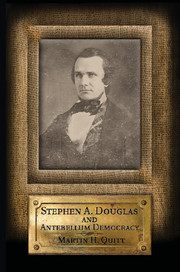Book contents
- Frontmatter
- Contents
- Acknowledgments
- Abbreviations
- Introduction
- 1 Adolescence in Vermont
- 2 Schooling, Learning, and Passing the Bar
- 3 Family Influences, Stress, and Bonds
- 4 Democratic Prodigy in Illinois
- 5 Constitutionalism, Part I
- 6 Constitutionalism, Part II
- 7 The 1860 Campaign and the Code Against Campaigning
- 8 In Lincoln’s Shadow
- 9 Douglas’s Mississippi Slaves
- Appendix Douglas’s Campaign Itinerary, 1860: June 23 to November 6
- Index
- References
7 - The 1860 Campaign and the Code Against Campaigning
Published online by Cambridge University Press: 05 October 2012
- Frontmatter
- Contents
- Acknowledgments
- Abbreviations
- Introduction
- 1 Adolescence in Vermont
- 2 Schooling, Learning, and Passing the Bar
- 3 Family Influences, Stress, and Bonds
- 4 Democratic Prodigy in Illinois
- 5 Constitutionalism, Part I
- 6 Constitutionalism, Part II
- 7 The 1860 Campaign and the Code Against Campaigning
- 8 In Lincoln’s Shadow
- 9 Douglas’s Mississippi Slaves
- Appendix Douglas’s Campaign Itinerary, 1860: June 23 to November 6
- Index
- References
Summary
Every political creed must be wrong which cannot be avowed in all the States of the Union alike.
Stephen A. Douglas (1860)Between June 27, when he officially accepted the nomination of his party, and November 6, when the presidential election was held, Stephen Douglas spent 160 days campaigning in more than 150 towns in twenty-three of the thirty-three states. What he did was unprecedented both in scale and in purpose. Although he began by paying lip service to the anomalous but powerful tradition that constrained election contests, Douglas eventually cast aside pretense and conducted the first overtly political campaign by a presidential candidate. Crowd estimates of the time were notoriously inflated or deflated according to the partisan leanings of each newspaper, but it is evident that several hundred thousand people were able to see Douglas in person, more than had ever seen or heard a presidential candidate.
Before 1860, only two presidential nominees, both of the Whig Party, had campaigned for themselves – William Henry Harrison in 1840 and Winfield Scott in 1852. Harrison gave twenty-three speeches over four months, according to an account that credits him with appearing “through the old Northwest.” In fact, Harrison confined himself to the one state where he had lived for a quarter-century – Ohio. Although he had earned his fame as a general and governor of the Indiana Territory, he declined an invitation to visit that state before the election because “improper motives would be ascribed to me.” Moreover, he explicitly disclaimed any electioneering purpose. He was not soliciting votes, only speaking to clear his name of the “continued torrent of calumny” poured on him by the opposition. He expressed what was by then the hoary creed of a presidential candidate, that “the bestowment of the office should be the free act of the People; and I have no wish to bias their judgment unjustly in my favor.”
- Type
- Chapter
- Information
- Stephen A. Douglas and Antebellum Democracy , pp. 134 - 168Publisher: Cambridge University PressPrint publication year: 2012



